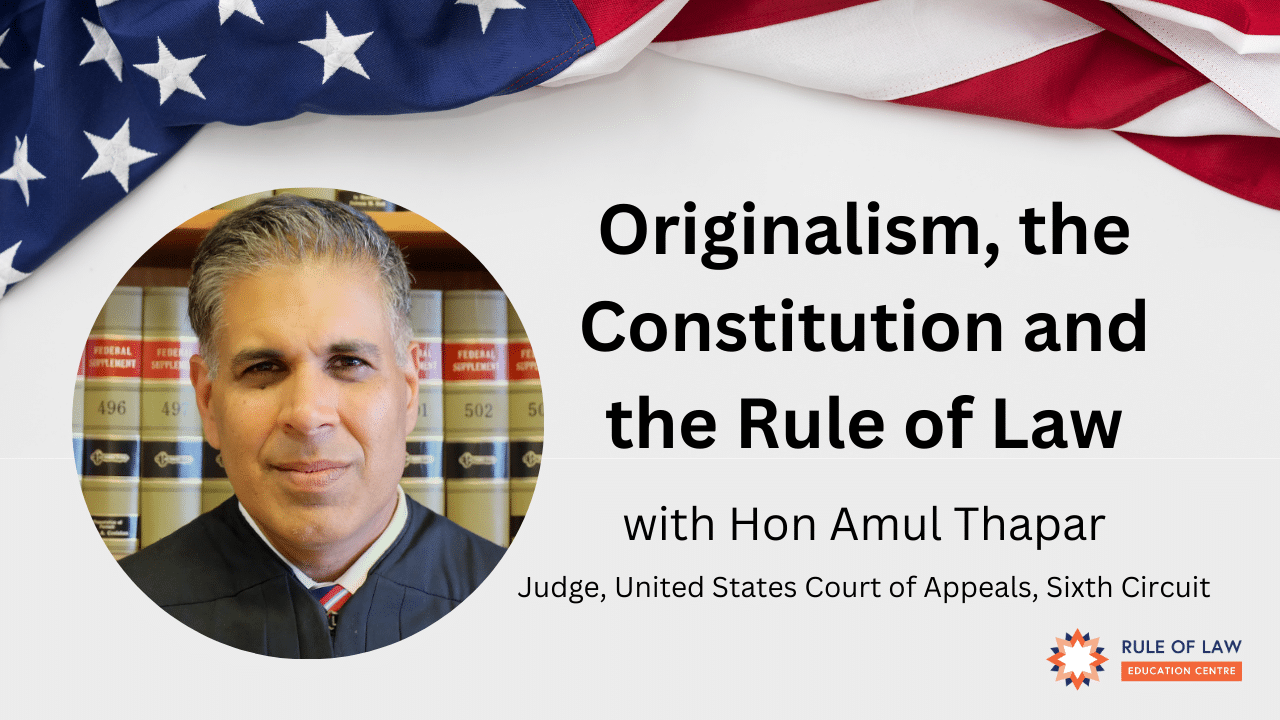A Response to the Question: What do you think of a Bill of Rights?
Thoughts from an American Judge about a Bill of Rights and the greater protection that the separation of powers provides.
There were three audible gasps when students on our Law Day Out Excursion were listening to Judge Thapar from the United States Court of Appeal, Sixth Circuit.
The students had already spent the morning at the Sydney Downing Centre Courts and had heard a talk from a Local Court Magistrate and sat in on real hearings, sentencing and bail applications. They saw first-hand the consequences of not following the law and they developed an appreciation of the judiciary and our justice system. School excursions to the Courts are often seen by Legal Studies students and teachers as the best excursion of the year.
But these students were in for an extra surprise.
The students had the opportunity to ask Judge Thapar questions about the Courts and Judiciary.

As you would expect from Year 11 and 12 Legal Studies students, they started with the hard hitting questions “Have you seen ‘Legally Blonde’?” To which Thapar replies No. Gasp One.
The second question, which is frequently asked by students attending our Law Day Out Excursions was “What has been your most interesting case?”
Judge Thapar outlined his trial of a South American Drug Cartel and how listening taps had revealed they had discussed taking a hit on him. Surprisingly, that was not what shocked the students. The students gasped when the Judge nonchalantly commented that he did not want special security provided by the police. Instead, all he would need was his gun under his jacket. This was not what the students were expecting. Gasp Two.
The final gasp came when the students asked another routine question based on a possible HSC question “What do you think of a Bill of Rights?” Typically, the textbook response is that a Bill of Rights would be a fantastic protection and a great opportunity to educate Australians about their rights.
Instead, Thapar quoted former US Supreme Court Justice Scalia saying
“North Korea and Russia have a longer, and many would argue a better Bill of Rights than most, but they are not governed by the Rule of Law. They are governed by dictatorial men and what we have is the separation of powers, and that is what is unique. It is what makes Australia unique.” He then outlined how the separation of powers, with an independent judiciary is one of the greatest protections of rights. This is a foreign concept to most Australian students, who have scarcely learnt the basics of our system of government and laws.
And there it was. Gasp Three.
The realisation that standing before them, and what they had seen all morning at the courts, was an independent judge. Most of these judges could not quote Elle Woods from Legally Blonde, nor carry a firearm, but they went about their work independently of the government, interpreting the law and ruling according to the law rather than their personal preferences or governments’ wishes. Students saw with clarity a concept that had possibly never been clearly articulated during their whole school experience.
The students saw the separation of powers with an independent judiciary as an important protection of their rights. And for this reason, Australia, even without a Bill of Rights, is ranked as having one of the best Human Rights standings in the world.
To many people, this last shock is hardly surprising. Most students (and teachers) cannot articulate what the separation of powers is, where it comes from and why it is important.
We have a problem with our Education system if basic legal and historical facts are not explicitly taught to students.
We will have a bigger problem, if the judiciary, who are without the power of the purse or sword (to reference another American, Hamilton in the Federalist Papers) do not have the confidence of the Australian people!
More Resources on a Human Rights Act and Separation of Powers
Click here to read Chris Merritt’s article: https://ruleoflawaustralia.com.au/commentary/others-have-charter-but-that-doesnt-make-it-right/
The team at the Rule of Law Education Centre interviewed Judge Thapar about originalism as a judicial philosophy and its importance in Constitutional interpretation. Click here to see the videos.
Lorraine Finlay, Human Rights Commissioner with the Australian Human Rights Commission, sat down to chat on camera with one of our Paralegals, Kate, at the Rule of Law Education Centre about human rights in Australia. Click here to learn more.
Do you think we should have a Bill of Rights or a Charter of Rights? Click here to see the pros and cons.



